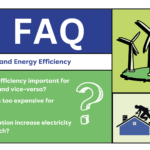In July 2016, the European Commission published their proposal for a regulation for CO2 emissions form the land-use (LULUCF) sectors.It contains three different ways of accounting for emissions or removals. We explain what they are and why having such a mixed bag isn’t good.
Under the Comission’s proposal:
- Afforested and deforested land (Article 6) is accounted for gross-net: total emissions and removals for the periods 2021-2025 and 2026-2030.
- Managed cropland, grassland and wetland (Article 7) are accounted for net-net: emissions and removals for the two periods minus five times the value of average annual emissions in the base period (2005-7).
- Managed forest land (Article 8) is accounted for as the emissions and removals for the two periods minus five times the Member State’s forest reference level.
CAN Europe is calling for net-net accounting.
But what do gross-net, net-net and forest reference levels mean?
Here a simple example: Country A has a sink of 10 MT CO2 in 1990 and 13 MT CO2 in 2012. It projected that in 2012, it would have a reduced sink of 8 MT CO2. (Thanks to FERN for the example)
- Under net-net accounting, it would account for the difference between 1990 and 2012, i.e. 3 MT CO2 of removals.
- Under gross-net accounting it would calculate the size of the sink in the year accounting takes place but not compare it to a base year. It would account for 13 MT CO2 of removals in 2012.
- Using a business as usual reference level, it would account for 5 MT CO2 removals, since the sink in 2012 was 5 MT CO2 larger than the country projected it would be.
Such a mixed approach is problematic for several reasons:
- Having three difference accounting methods makes them not comparable.
- Because forest management activities (which make up almost all of the sinks) are accounted in most of the Member States against a forest reference level (business-as-usual projection), emissions from forest management are mostly not accounted – while removals are.
- The reference levels used for forest management are inherently unreliable and can easily be exaggerated, so that a Member State can hide actual emissions.



